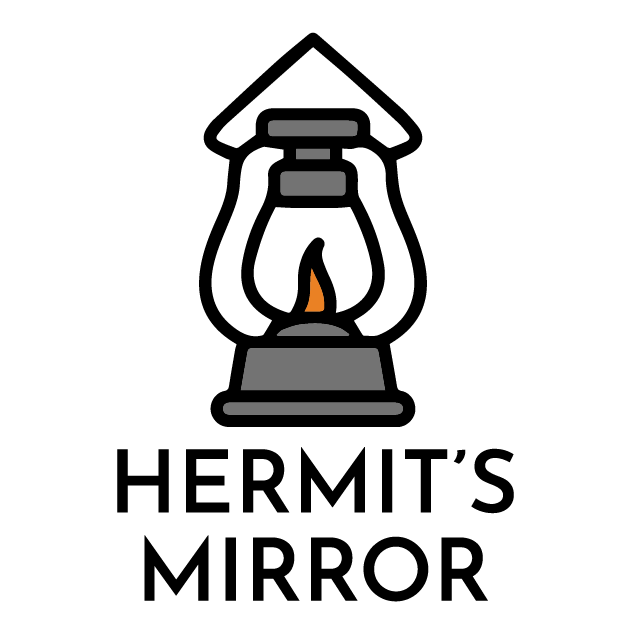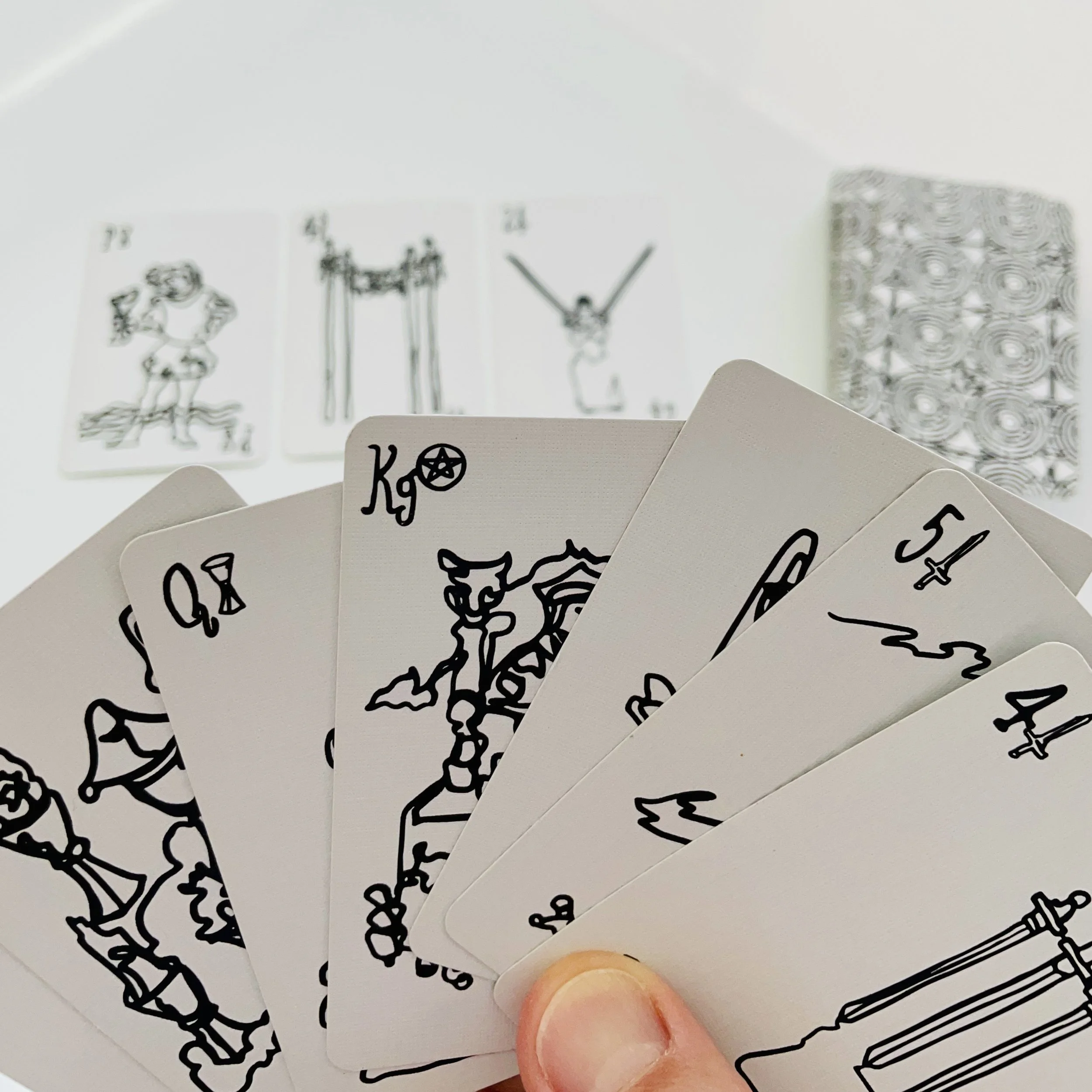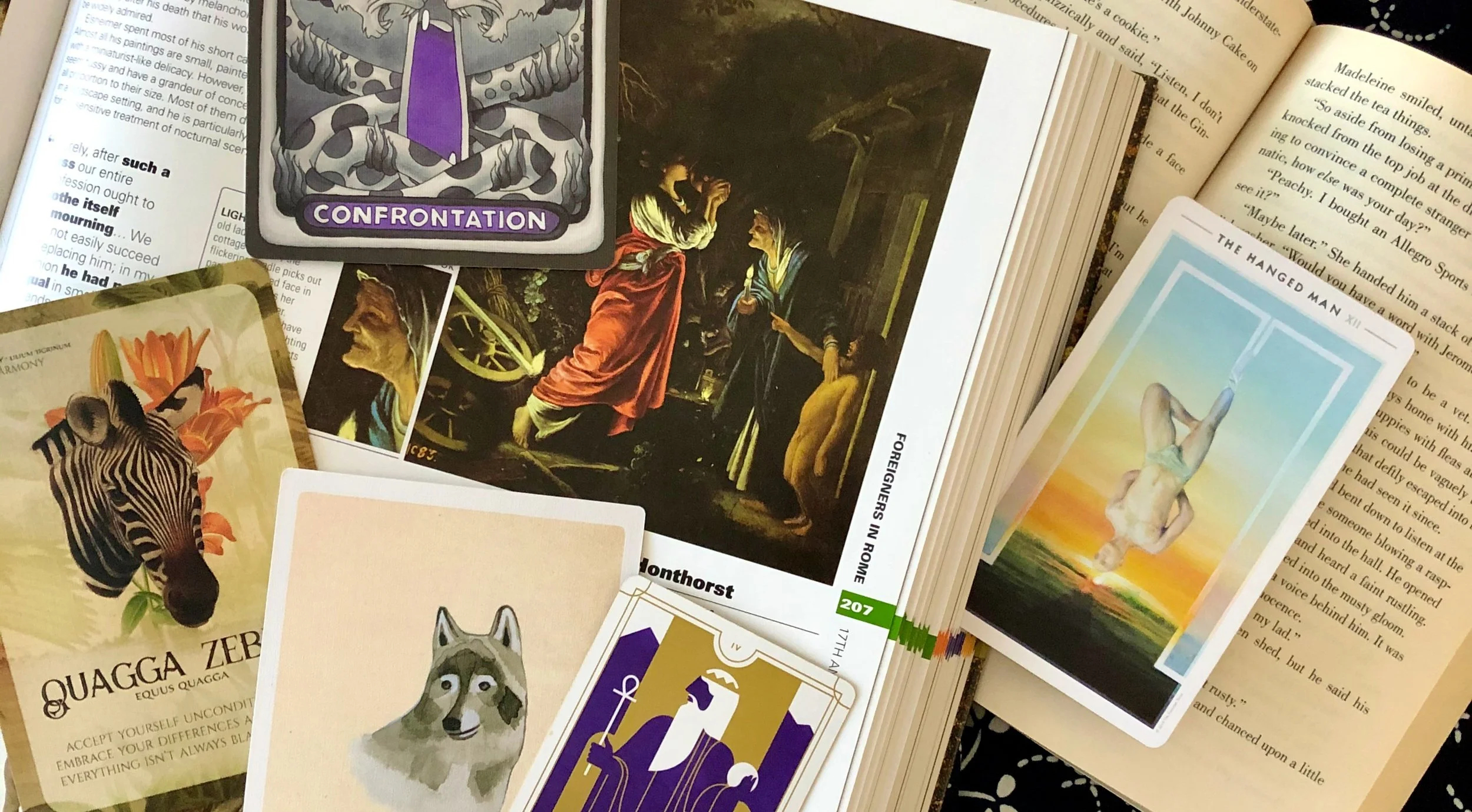Are You Really Drawing Cards at Random? Or Is There Something More?
Randomness is an important component to many forms of divination. But why?
One of the simplest things a tarot reader does to legitimize their reading is to shuffle. Shuffling, shaking rune bags, and similar techniques for randomizing the implements of divination provide the sense of authenticity and providence. The card, rune, charm, or whatever that is pulled forth is the one that is meant to be there. It was random. How could its relevance—its relevance despite the random nature—be anything but significant? When the cards don’t feel random—imagine pulling the 5, 6, and 7 of Wands or all Knights in a row—something feels somehow off. Only the most stalwart wouldn’t reshuffle. In this way, shuffling is a useful grounding tool that makes us feel more confident, present, and legitimate as a reader.
But does the randomness really matter to the reading?
If you believe that your intuition secretly knows where every card is and can pull the “right” one or that angels or spirit guides or your ancestors are physically manipulating your hands so that you choose the “right” cards, then the randomness doesn’t matter per se. The shuffling just allows you to find and feel your way to the right card and have your intuition or guides, etc. step in at the right time. But the divine intervention doesn’t really require randomness.
And if you don’t believe that there is some form of divine intervention, then what is the point of the random shuffling?
Do you have to accept the hand you’re dealt? The minor arcana of the original Life Line Tarot was designed to look like playing cards, to evoke their playful power and to let you play card games with them more easily.
If you’ve been reading cards in the open for long enough, chances are good that you’ve run across a skeptic who says something like, “If tarot was real, you would pull the same card twice when asking the same question twice.” (And if you would say such a thing, keep reading. There’s a lot I can teach you about tarot.) Most of us would argue that that’s not how tarot works. There isn’t just one card that can answer each specific question truthfully. We find shades of meanings in all of the cards, and each one articulates the answer in a different way.
But why shouldn’t we expect a similar answer to the same question when nothing significant has changed?
One of the ways around this problem is to say that you can’t ask the same question more than once. This imposition on the querent happens to have a useful psychological or even spiritual purpose. For the former, the rationale goes something like this: the cards have shared their wisdom, so if you can’t accept their wisdom, then that’s on you and your inner baggage. And for the latter, you might say that asking for a new bit of wisdom is ignoring their advice or disrespecting your spirit guides and ancestors. But it’s also a convenient excuse for not having to repeat your results!
And for me, that’s a problem.
You should be able to repeat your results. You might not be able to pull the exact same cards—although you will probably be surprised by how often some reappear—but you should be able to derive the same general message from a new set of cards if you’re asking for the same guidance. In fact, the reason to not ask the same question twice is so that you don’t encourage fishing for a “better” answer. If you struggle to find a shared meaning in the cards, it’s not because it’s not in the cards; you probably just need a deeper understanding of what they can mean, which brings me to my point about randomness and whether it’s important.
The way that I read cards is as a tool for tapping into my intuition and focusing my mind on what matters most to express from that hidden font of knowledge within. In theory, you could ask a question, and it wouldn’t matter what card came up: my intuition would still be activated in a way to help me find the meaning. The card is just the lens through which I articulate inner wisdom. It’s the flavor of my words or the starting point of the story, not the moral.
The Magician in reverse (shown here from the True Black Tarot) could as easily represent the loss of personal autonomy and control in a relationship as the 7 of Swords or Strength.
Any card can answer any question.
I’ll take an example from an impromptu Instagram live I recently held. I imagined that someone was worried about their relationship and what they should know about their partner. I pulled the 7 of Swords, a card that is often about deception and, in relationship readings, infidelity. Now I don’t think I can access someone who’s not part of the reading—the partner in this case—but the 7 of Swords speaks to the querent’s fear that their partner is being deceptive and how they might want to correct or address that behavior.
As a second card that answers that same question, I pulled Strength. On the surface, this seems like a completely unrelated card. But my intuition in this hypothetical situation was able to recognize that Strength is a card of controlling animal passions and lust, as seen by the virtuous virginal figure holding the lion’s mouth shut. Again, there’s a desire to control and correct inappropriate behavior. That’s the shared message.
In my intensive fundamentals course, Read Tarot like a Nerd, we cover an exercise for finding the overlap in two cards as they answer a question together—not as a 1–2 sequence but as a Venn diagram of overlap or shared characteristics. It’s a handy exercise, and I’ll be using it as the basis for my next divination challenge, so if you’re not comfortable with the idea that any card can answer any question, it’ll be a good challenge for you to explore.
But to come back to that original question, the very title of this post, I’m curious what you think is happening in the randomness of divination.
Shuffling is useful. It’s a form of grounding and becoming present, and it allows the reader to take some time to set intentions. And if reading for another, the reader can come into the same energetic space as the querent during this time. So I recommend it. The question remains as to how important the randomness created by shuffling is. And it’s worth asking yourself whether you believe the cards are really random or whether they’re divinely chosen or even destined.
What you believe affects how you understand divination to work. That affects the kinds of answers you divine, and that in turn affects what questions you ask and how you ask them. It also affects what you do with the cards afterwards.
If you use tarot and other forms of divination as a tool for pulling what is subconscious to the surface of awareness, and you don’t believe that there is a divine hand at work, then randomness helps remove fears of conscious decision-making. Your conscious self is just as capable of working with something random as it is with something predetermined, but at least you’re giving yourself something unknown to work with. This is different from a more intentional form of self-reflection, where you might actually choose a card to work with because it helps you connect with a particular experience or fantasy.
If you believe that there is some magical or spiritual facet to the shuffling of the cards—that is, you believe that there are divinely chosen (or similar) cards that are the right cards for your question—then you aren’t actually looking for randomness. You’re looking for something explicitly non-random. Shuffling typically allows you to have the opportunity for the divine intervention of non-randomness to occur. For example, if you plan to pull three consecutive cards, but you haven’t shuffled your deck, then the options that your angles have to work with are limited. And if you believe that you have to feel the energy of the card to find the right one, then shuffling allows you to touch all of the cards and experience that shift in energy.
If, on the other hand, you use the cards as a lens by which your intuition is activated, what purpose does randomness serve? For most of us, I think it helps remove that conscious interference. You can call it ego or everyday concerns or whatever, but we often come to a reading with pre-existing ideas or concerns, and the randomness helps us short-circuit the expected thought patterns just long enough for our intuition to sneak past our conscious defenses. It’s a lot like the purpose behind randomness for the person seeking answers from the subconscious. Conscious thought will still come into play, but you have to at least give the other parts of your mind a fighting chance to emerge.
None of these considerations probably changes whether you shuffle your cards or shake your charms. But I hope that it invites you to think about what you believe and why you act upon those beliefs (or don’t) in different ways.
My Portals of Being year-ahead reading involves a whole array of divination techniques, and the spiritual “feel” matters quite a lot in those.
I say this from experience.
Recently, I started a bibliomancy book club. (You can read more about the purpose the books, and the schedule in the “Bibliomancy Book Club” post.) Some of my assumptions about bibliomancy and how it works “best” for me are based in the idea of the book as a physical object. I’ve certainly done word-based divination with random paragraph/sentence generators and with randomized playlist song titles, but it feels fundamentally different from bibliomancy with a book held in my hands.
But why?
Side note: Why? is a key sentence for the curious seeker. This is especially as the information age tries to drown us all in the what and, to a lesser extent, the how. But How? is a distant second in importance to Why? If you understand the how, you can at best only assume the why. But if you know the why, you can often work out not only the how but also other potential hows. That’s why I keep asking Why? in case you were curious.
When flipping through a book for divination, I expect my hand to feel the correct page (and place on the page) directly through the page itself. If I believe that my intuition is deciding that right page and place, I need to think about how that’s possible. What knowledge of this book do I believe my intuition to possess that it can guide my hand? Or is my intuition suppressing that “right” feeling until it knows that I’m in the right headspace to interpret the words, whatever they are?
Or is there some divine or magical intervention for bibliomancy? Do the book’s pages resonate with different energy that is within the book as a pseudo-magical object itself? In an animist tradition, the book has its own aura that interacts with mine. That seems most likely to how I work with books and (often) cards. There’s a feeling of “rightness” to a card just as there is with a book page.
Then again, I do call on divine guidance when conducting readings with bibliomancy. I even do it before reading cards in more explicitly spiritual and woo styles of reading, such as for my ancestral or past life readings and my year-ahead readings. In all of those instances, I also allow myself to “feel” my way to cards, rather than just accepting whatever happens to be at the top of the pile. So maybe there’s something divine happening through my very fingers that I haven’t admitted or acknowledged.
There is no right answer to all of these questions and no right way to believe or divine, which might be frustrating for some people. (Those people probably don’t bother to read this far into one of my posts.) But I hope it opens you up to asking questions of your practice. I don’t mean to add uncertainty or doubt but instead to free yourself from unnecessary constraints. Sometimes, as with shuffling, there are multiple useful purposes beyond the one that we think of as the priority. For me, shuffling is not really about making the cards random, which is why I don’t worry about whether I’ve shuffled “enough” for randomness. Instead, I shuffle until I feel as if I am grounded, connected, and in the right headspace to receive the messages.
And that leads me to my last unfinished thought from before.
Once you realize that you don’t need randomness in the cards to make meaning, you’re more free to create new meanings using the cards you want to see or expect to see. And while you aren’t “receiving messages” in the form of divination when you choose your cards, you are engaging in other powerful acts with tarot, such as manifestation, goal-setting, and energetically focusing.
Tarot doesn’t have to be a one-way tool of reception. It can also be a tool of energy activation. In a card game, you often discard and draw replacement cards. Why can’t you do that with your own game of life?
Did you learn something?
If so, you may love my intensive fundamentals course for new and experienced tarot readers, Read Tarot like a Nerd. A new 5-week live session of the course is starting up January 18, and the self-paced version is available all year-round.



